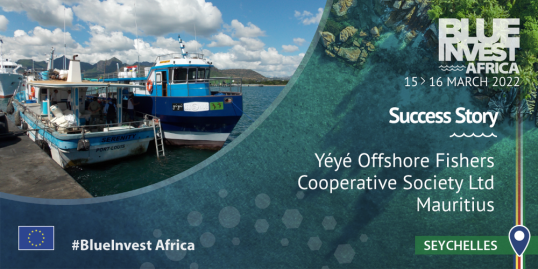2019 was a life-changing year for the six fishermen of the Yéyé Offshore Fishers Cooperative Society Ltd. Based in Port-Louis, the capital of Mauritius, they took part in a government grant programme intended to promote the development of fishing cooperatives from the island. The programme is supported by the European Union (EU), as part of the Sustainable Fisheries Partnership Agreement (SFPA) concluded in 2013. The objective of this partnership is to support the development of sustainable fisheries (to ensure fishing is environmentally and economically sustainable) and well-managed fisheries (to ensure stocks are fished responsibly) in Mauritian waters.
New tool
Thanks to the programme, the Yéyé cooperative acquired a brand-new fishing boat. Built in Sri Lanka, 18 meters long, with a 6-ton load capacity and fully equipped, this "semi-industrial" boat can perform multiple weeks’ campaigns on the high seas, far from the coastal zone that has been the usual workplace for the six fishers, but where fish stocks are diminishing.
“Leaving the lagoon” is what they say in local jargon. The boat goes far beyond the barrier of coral reefs and allows them to exploit the vast exclusive economic zone of Mauritius. The new semi-industrial boats do not target tuna shoals, for which hunting requires more specific means, but they target snappers, groupers and other demersal species that live "on the banks", as locals call the sandy shallows of Saint-Brandon, Saya de Malha, Nazareth and Albatross, 500 km north-east of Mauritius.
New horizon
The horizon of Yéyé’s fishers has since widened considerably. For Judex Rampaul, the secretary of the cooperative, going on the high seas means bringing back more and better-quality catches, which bring in more profitable customers; enough to generate more significant and regular income. This marks the transition from a family activity to business management.
Fish is the main source of protein in Mauritius. However, local catches do not represent half of the national consumption. The potential demand therefore makes it possible to envisage the development of a promising market. In addition to equipping cooperatives, the government has also decided to invest in the commercial side of fishing by financing the equipment of a processing cooperative and the purchase of refrigerated vans.
As we can see, a well-equipped fleet, which allows fishers to deploy on the entire fishery resource, can considerably improve the daily life of an entire socio-professional category. Provided that rigorous management of fish stocks makes it possible to include this deployment in sustainable development.

